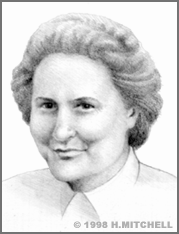Temple Grandin
Temple Grandin is our nation’s most expert designer of humane facilities for livestock animals.
At the age of 2, Grandin was diagnosed with autism, a psychological tendency towards introversion and detachment from the world. Alienated, as a child, from the emotional and social life of her peers, Grandin used the positive aspects of her condition – powers of logic, observation, and focus – to become an accomplished scientist. She went on to earn a PhD in Animal Science at the University of Illinois in 1989. Her area of expertise is the care and handling of livestock, including their processing in meat plants.
Perhaps Grandin’s unique perspective helped her to focus on a field of animal science that might make even the most enthusiastic carnivore squeamish. But whatever the cause, the effect of Grandin’s work has been a significant improvement in how safely, humanely, and productively cattle, sheep, and pigs are treated.
Grandin has designed a number of systems that use behavioral principles, instead of brute force or fear, to handle livestock. The improved squeeze chutes and restraint systems that she invented prevent animals from being hurt and keep them calm, by nearly eliminating upsetting sights and sounds, jostling, and especially pain. Grandin believes that it is worth a little extra expense to decrease the suffering that food animals must undergo. Her center-track restrainer system is now used to handle almost half the cattle in North America. She has recently improved it with a more efficient, double-rail system.
Temple Grandin is currently an assistant professor at Colorado State University. She is also an outspoken critic of ranches and slaughterhouses that show little concern for their animals. She has shared her expertise, on animal handling and on autism, many times on television, in newspapers and magazines, and in over 300 scientific articles.
She has received multiple honors, including the 2004 PETA Proggy Award, which recognizes those who design innovative and animal-friendly achievements, and being recognized as one of TIME magazine’s Most Important People of the Year in 2010. She is a speaker for TED, where she talks about the relevance of autism and tries to bring insight and understanding to the world.


